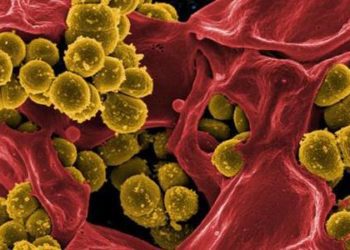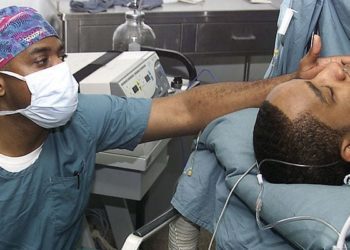A molecular link between sleep deprivation and insulin resistance
Image: CC/I. Yonemoto
Key study points:
1. Sleep deprivation led to reduced insulin sensitivity in subjects’ adipocytes, as indicated by reduced insulin-dependent AKT phosphorylation.
Primer: Epidemiological evidence has suggested a link between sleep deprivation and metabolic conditions such as obesity and type 2 diabetes. However, the molecular basis of this epidemiological observation has yet to be explored in depth.
Insulin’s mechanism of action is well-understood. Insulin binding to the insulin receptor of a cell leads to activation of PI 3-kinase, which phosphorylates PIP2 to PIP3. AKT (also known as protein kinase B or PKB) and its activator PDK1 both bind to PIP3 in the plasma membrane. This colocalization allows AKT to be phosphorylated and activated. Downstream signaling from phosphorylated AKT leads to an increase in GLUT4 glucose transporters on the cell surface, allowing increased glucose uptake. Total and phosphorylated AKT were used as measures of insulin sensitivity in this study.
Background reading:
1. Spiegel, K., Tasali, E., Leproult, R. & Cauter, E. V. Effects of poor and short sleep on glucose metabolism and obesity risk. Nature Reviews Endocrinology 5, 253–261 (2009).
2. Shulman, G. I. Cellular mechanisms of insulin resistance. J. Clin. Invest. 106, 171–176 (2000).
This [randomized crossover] study: Seven young, lean volunteers were enrolled in the study. Each was exposed to a sleep-deprivation regimen and a normal-sleep regimen, at least four weeks apart. There was a one week run-in period before each sleep regimen. The sleep regimens took place in an inpatient setting, where sleep was monitored with polysomnography and activity and calorie intake were controlled. Participants were randomized to either undergo the sleep-deprivation regimen first or the normal-sleep regimen first.
Total body insulin sensitivity was measured at 10am on the fourth day of each regimen via a frequently sampled intravenous glucose tolerance test (FSIVGTT). A sample of subcutaneous abdominal fat was collected after the FSIVGTT. Adipocytes were isolated from fat samples and treated with increasing concentrations of porcine insulin. Protein was isolated from the samples and Western blots were used to detect total AKT (tAKT) and phosphorylated AKT (pAKT). Western blots were quantified with densitometry.
Total body insulin sensitivity was decreased after sleep deprivation, in accordance with previous findings. The authors also show that in all but one participant, the pAKT-tAKT ratio was decreased after sleep deprivation compared to normal sleep. They calculate a 30% reduction in insulin sensitivity in the adipocytes between the normal sleep and sleep-deprived regimens.
In sum: This study provides the first evidence of an effect of sleep deprivation on a metabolic molecular pathway. Limitations include the small study size, and the possibility raised by editors that circadian rhythms and light exposure might be confounders. The full molecular link between sleep and insulin resistance remains to be elucidated, but this is an exciting first step from epidemiological observation to molecular mechanism.
Click to read the study in Annals of Internal Medicine
Click to read an accompanying editorial in Annals of Internal Medicine
By [TJ] and [MP]
© 2012 2minutemedicine.com. All rights reserved. No works may be reproduced without written consent from 2minutemedicine.com. DISCLAIMER: Posts are not medical advice and are not intended as such. Please see a healthcare professional if you seek medical advice.






